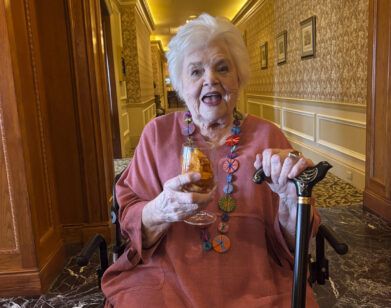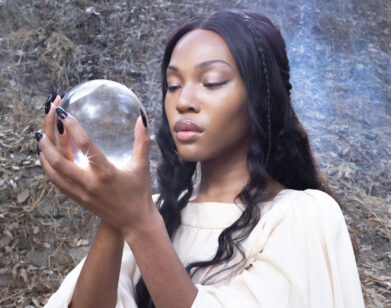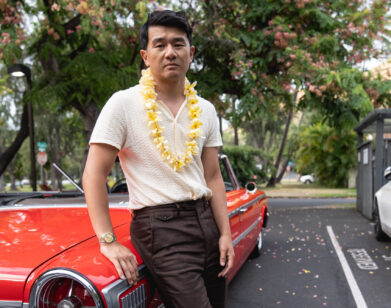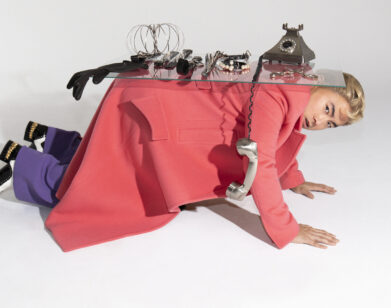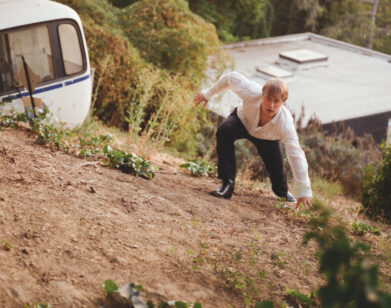IN CONVERSATION
Joe Castle Baker Is “the Mr. Bean of Bushwick,” According to John Early
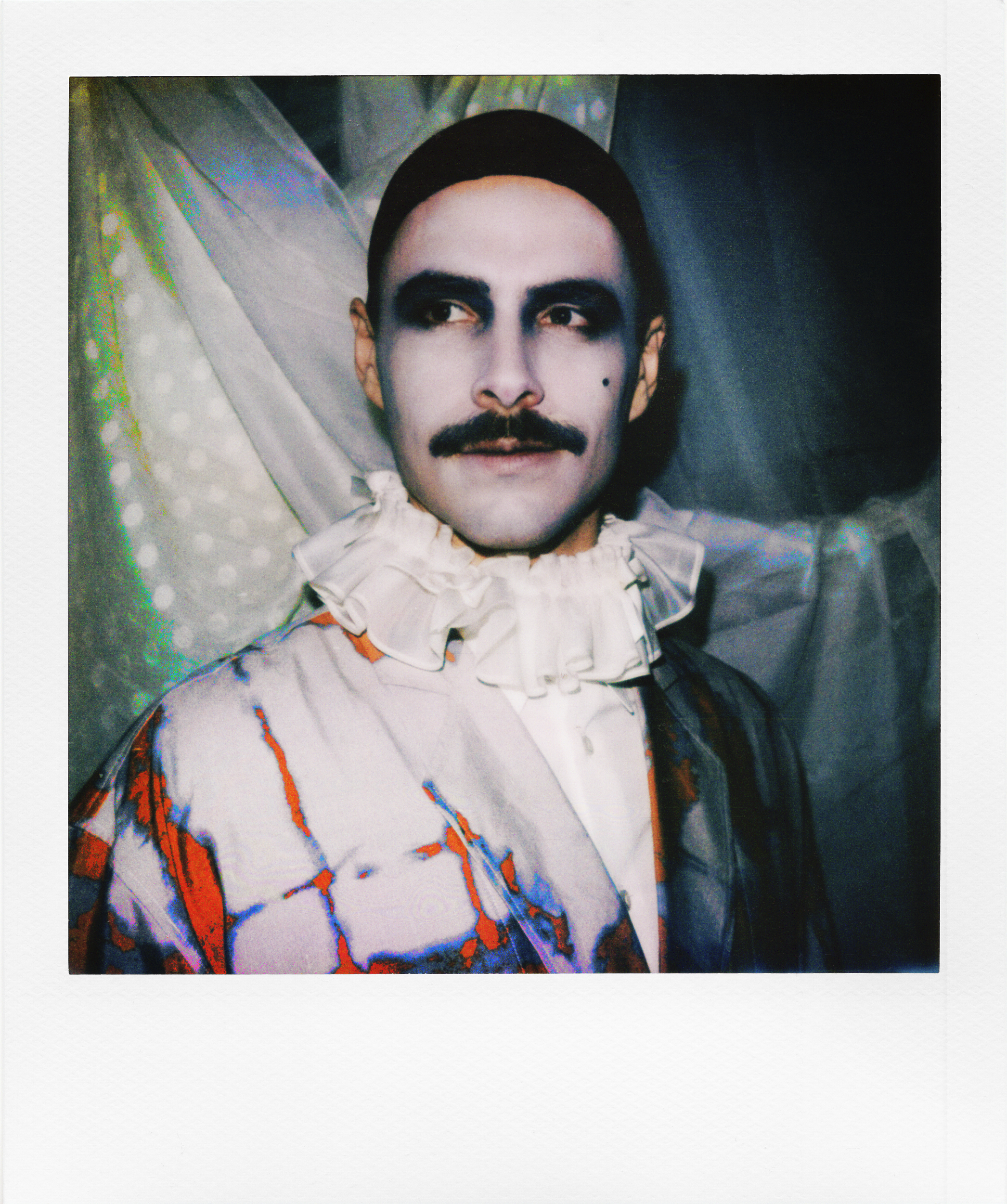
Necktie by Saint Sintra. Shirt by Ermeneglido Zegna.
The Brooklyn-based comedian, actor, and writer Joe Castle Baker has a love-hate relationship with social media. On the one hand, it’s where he’s amassed a following in the tens of thousands (nearly 49K on TikTok and 37K on Instagram), with his goofy, deranged front-facing videos—think the facial contortions of Jim Carrey combined with the vocal acrobatics of Robin Williams—sending up the performative earnestness that has come to define the form. On the other hand, he’s now a participant in the “firehose” of self-promotion, as he and his fellow comedian John Early put it on a recent phone call. But, Early adds, Baker manages to rise above the fray and earn himself a moniker the world didn’t know it needed: the “Mr. Bean of Bushwick.” —EVELINE CHAO
———
JOE CASTLE BAKER: John, thanks so much for doing this. I really appreciate it.
JOHN EARLY: I’m interviewing you!
BAKER: I know, but I feel flattered to be interviewed.
EARLY: Okay, and yet you still feel the need to start it.
BAKER: I wanted to start it because I want everyone to know that this is on my terms.
EARLY: It’s really inspiring to see a gay man take charge in the way that you’re doing right now. Before we really dig in, are there any “no-fly zones?” Your career? Your family?
BAKER: None. If something comes up, I will end the call.
EARLY: Okay, great. My first question, obviously, is, was it hard growing up gay in California?
BAKER: Yes. Believe it or not, I think of California as a red state. I was the only gay kid at my private school.
EARLY: Me too! One of your videos reminded me that when I was in sixth grade, we had to do a persuasive essay in English class. And I, completely not being conscious of my own gayness, did an essay on gay rights. Like, in support of gay rights.
BAKER: What did you say?
EARLY: I have no idea. I was like, “Men should be able to hold hands in public.” But I remember the teacher being like, “Who wants to do theirs at assembly? Who wants to volunteer to do this for the entire middle school?” And I raised my hand and he was like, “I don’t think so.” In a very beautiful way, he was protecting me from exposing myself. Because the key thing is that I started the essay by being like, “By the way, I like girls.”
BAKER: Of course. You have to.
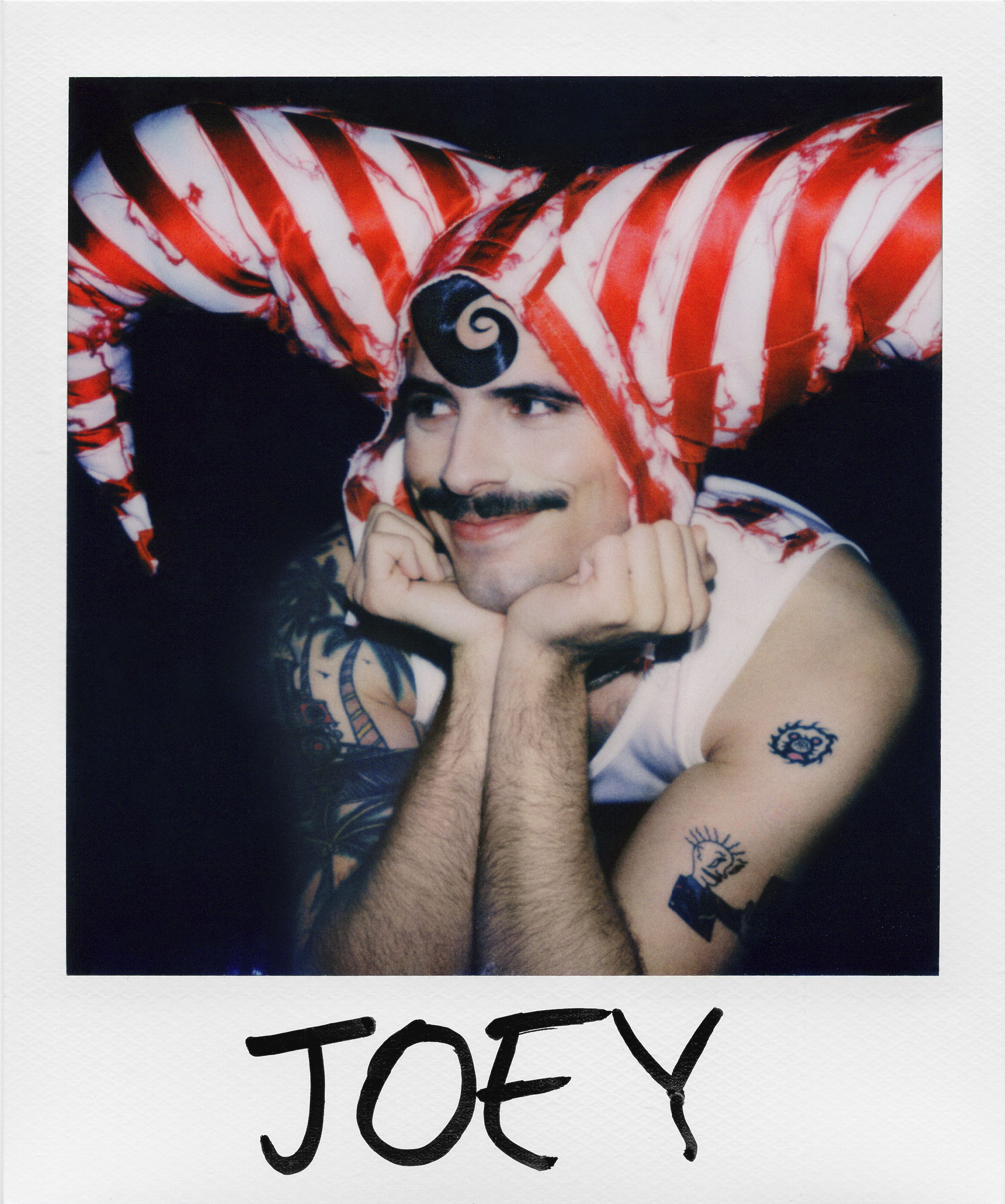
Custom Headpiece by Saint Sintra. Tank Top by Alexander McQueen. Pants by Prada.
EARLY: I genuinely thought I did. That’s why he was protecting me from doing it at assembly. Were you the only gay guy in your class? Was it because it was a private school with small class sizes? Like, there just weren’t that many people in general?
BAKER: Yes, but there were certainly enough people for there to be plenty of other gay people in the class. And I came out the day I graduated. Because I was kind of a model student and I knew that if I came out, they would make me give some kind of speech at assembly, being, “It’s okay to be gay.” And I didn’t want to do that. I knew I was gay when I was in fifth grade.
EARLY: Okay, it’s not a competition.
BAKER: I looked in this puberty book and I saw the 20-word section about homosexuality and I was like, “Oh, fuck. That’s me.” I remember thinking that. I put the book down and was like, “Oh, god, that sucks.” And then, the next day I spread my wings, flew to New York, and the rest is history. Right then and there.
EARLY: And you started doing comedy right then and there, as a fifth grader.
BAKER: That’s right. No, it actually took years and years of torment before I was finally okay with it, which feels so clichéd now.
EARLY: I know I was being silly asking about it being hard to grow up gay in California. But was it actually not progressive? Am I mischaracterizing California?
BAKER: I went to the more conservative school. All of the other boys that I was friends with were extremely scary to me. Because they would just say the most horrendous, horrendous things, and their parents would be the top-paid lawyers in all of Los Angeles. They could get away with anything, so there was this sense of: This is a very scary place. I probably could have come out and it would have been completely fine, but I had this sense that it was not okay. When did you come out?
EARLY: The first people I told were my two best friends when I was in eighth grade. Then I didn’t come out to my parents until I was a freshman in college.
BAKER: Well, you win there. You came out earlier than me.
EARLY: When did you come out?
BAKER: When I was 15, at camp. Everyone started crying. Just imagine that.
EARLY: Oh my god. Were they crying in horror?
BAKER: They were just like, “Oh my god. This is so amazing.” Because it was a theater camp, and we were doing a play about fear that we were writing. We were all in a circle, doing a brainstorm session about what we’re afraid of, and we were maybe an hour into this thing. And one of the camp counselor leaders was like, “Joe, you’ve been really quiet. Why? Is there something on your mind?” And then the next thing I was like, “Yeah, the reason I’ve been quiet is that I am scared of something. I’m gay.”
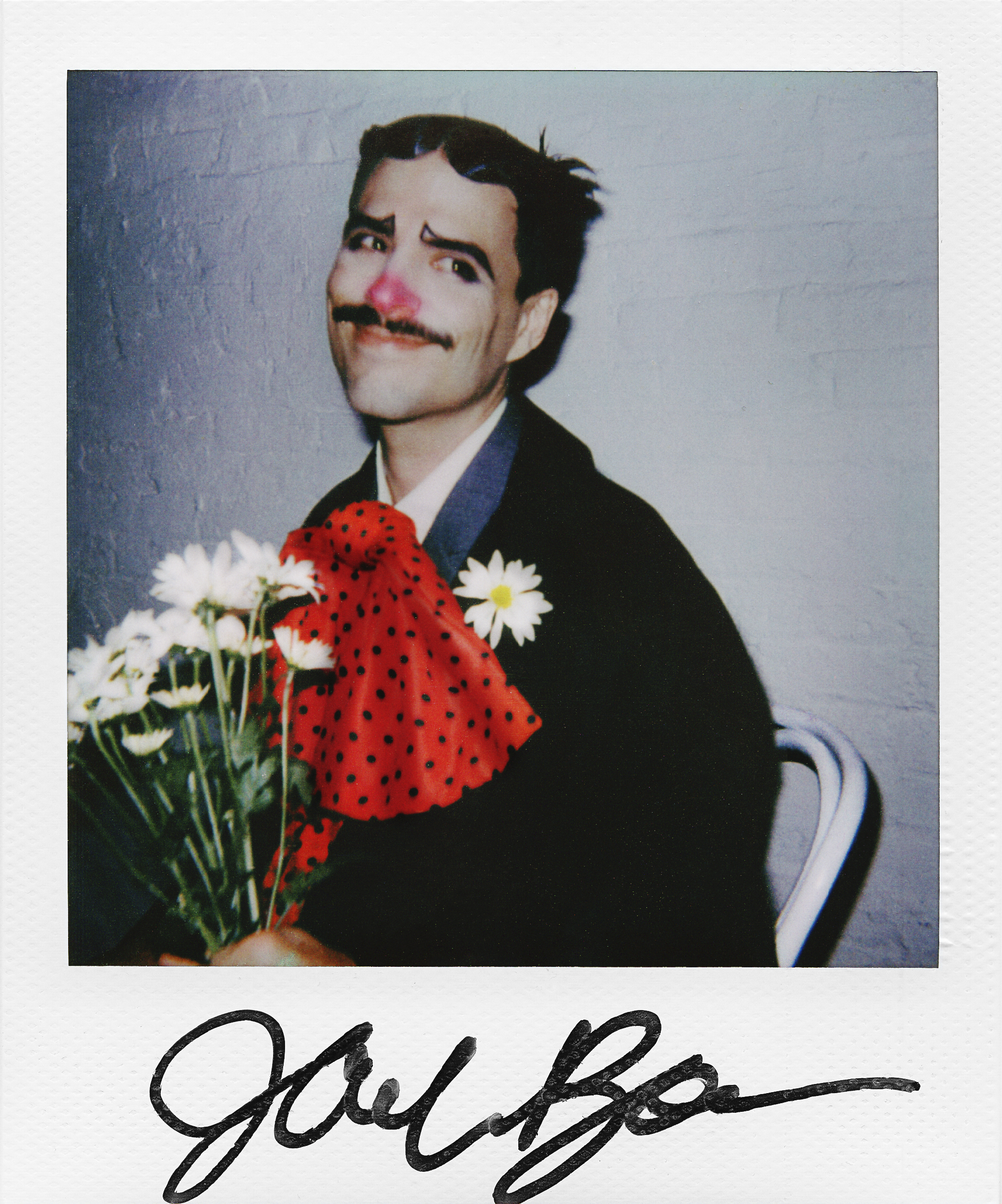
Shirt and Coat by Prada. Red Bow Tie Stylist Own.
EARLY: That was the first moment of telling anyone at all?
BAKER: I think I told a therapist before that.
EARLY: Who you had a huge crush on.
BAKER: I mean, I had a crush on literally everything when I was that age.
EARLY: Oh my god. Any man who was nice to me in any way, I was weeping.
BAKER: Right? You’re just crazy when you’re that age. The hormones make you insane.
EARLY: It’s funny because I feel like we’re modeling right now exactly what I came prepared to criticize. But the truth is, I’m loving hearing this tender story.
BAKER: I know. I make fun of it so much, and then underneath it is just this profound sincerity. It’s perfect.
EARLY: This is why I feel a kinship with you. I feel that we have a similar kind of disgust for the using of one’s own coming-out narrative or gayness, or even one’s identity, in art. But maybe some of the anger is actually about the fact that we do have a fixation on our identity or our coming-out story.
BAKER: Maybe. I don’t know how you feel, but I would never tell that story to the public.
EARLY: Too late.
BAKER: But I am private in this way where that part of my life, or anything that I actually care about, I hold close to me. I feel like a lot of people are just so cheap about it, particularly on social media, where it’s like, “What are you doing? You’re selling yourself.” I don’t know. I don’t mean to judge. I never judge.
EARLY: Which is what I love about you. You never judge.
BAKER: Thank you. Write that down. But there is something about it that’s repellent to me, and maybe that’s just being homophobic, I don’t know.
EARLY: Do you think gayness is over? I don’t know what I mean by that, by the way.
BAKER: I don’t know what you mean either, but I know exactly what you mean. I had this experience where it felt so hard being gay, and then the second I came out, I was like, “Wow, it’s literally not even a thing anymore.” It does feel like, who cares if you’re gay? But I say that and somebody’s going to be like, “How dare you?” There are still people who struggle with it.
EARLY: Of course. Professionally, I definitely felt a window opening up early on when I was starting to do stand-up. I felt this sick opening of a market for an alternative, kind of contrarian gay identity.
BAKER: Which you spearheaded—at least for me, when I was seeing you in “Showgasm” and things like that.
EARLY: When you were 12.
BAKER: When I was 12, yeah.
EARLY: When your mom would let you stay up late to watch “Showgasm.”
BAKER: Yeah, “let me go to Hell’s Kitchen late at night.” There wasn’t even Uber back then, I had to do it the old-fashioned way! But you did open up this whole way of being gay onstage that was more alternative and more nuanced than anything I had seen before. I guess the only way I had seen it before was, like, Andy Dick, who’s not even gay.
EARLY: Is he bi?
BAKER: I think he openly identifies as bi.
EARLY: Let me quickly search. “Andy Dick openly bi…”
BAKER: I remember feeling really scared of him. He’s kind of scary.
EARLY: He felt dangerous, for sure. But, I did feel, in the beginning, this interest in the industry for gays who do things a little differently. And I had a simultaneous disgust for that niche market, and then also my obvious exploitation of that and using it to my benefit to have a goddamned career. But I feel like within five minutes it was over. There’s nothing interesting about it now. I feel like Valerie Cherish, just kind of discarded.
BAKER: When you create something that is so good, it becomes this viral affect. Other people are like, of course I can do this character, or do it like that or be this voice, because it is so infectious. But then you’re like, “Okay, well, I made that, by the way.” That’s me impersonating you.
EARLY: It felt like a very homophobic impersonation. Gayness or identity aside, every authentic eruption of any funny thing immediately gets copied by a million people because of TikTok and Instagram and social media. It’s so fucking fast. We work through these things that pre-social media would take years to congeal as some sort of style in comedy. But now there’s no time to catch your breath and even know who’s funny. I feel like it robs people of the chance to actually develop themselves. Or maybe I’m just old-fashioned and I’m not with the times. You, on the other hand, have managed to actually disrupt the mania enough for me to see you. You’ve cut through the noise.
BAKER: That’s very flattering. I feel that way, too. Sometimes I’ll load up Instagram and be like, “Oh, dear god. This again?” It feels like there’s some kind of cruelty to it. I don’t know how else to describe it. It’s weirdly constant. There’s just always something.
EARLY: It’s a fire hose.
BAKER: It is a fire hose. I do feel weird participating in it. I was talking to my therapist about this. I was like, if you had told me that what people would be talking about, about me right now, would be my social media videos, I would be like, “Dear god, what the fuck happened?” But I try to not take it seriously.
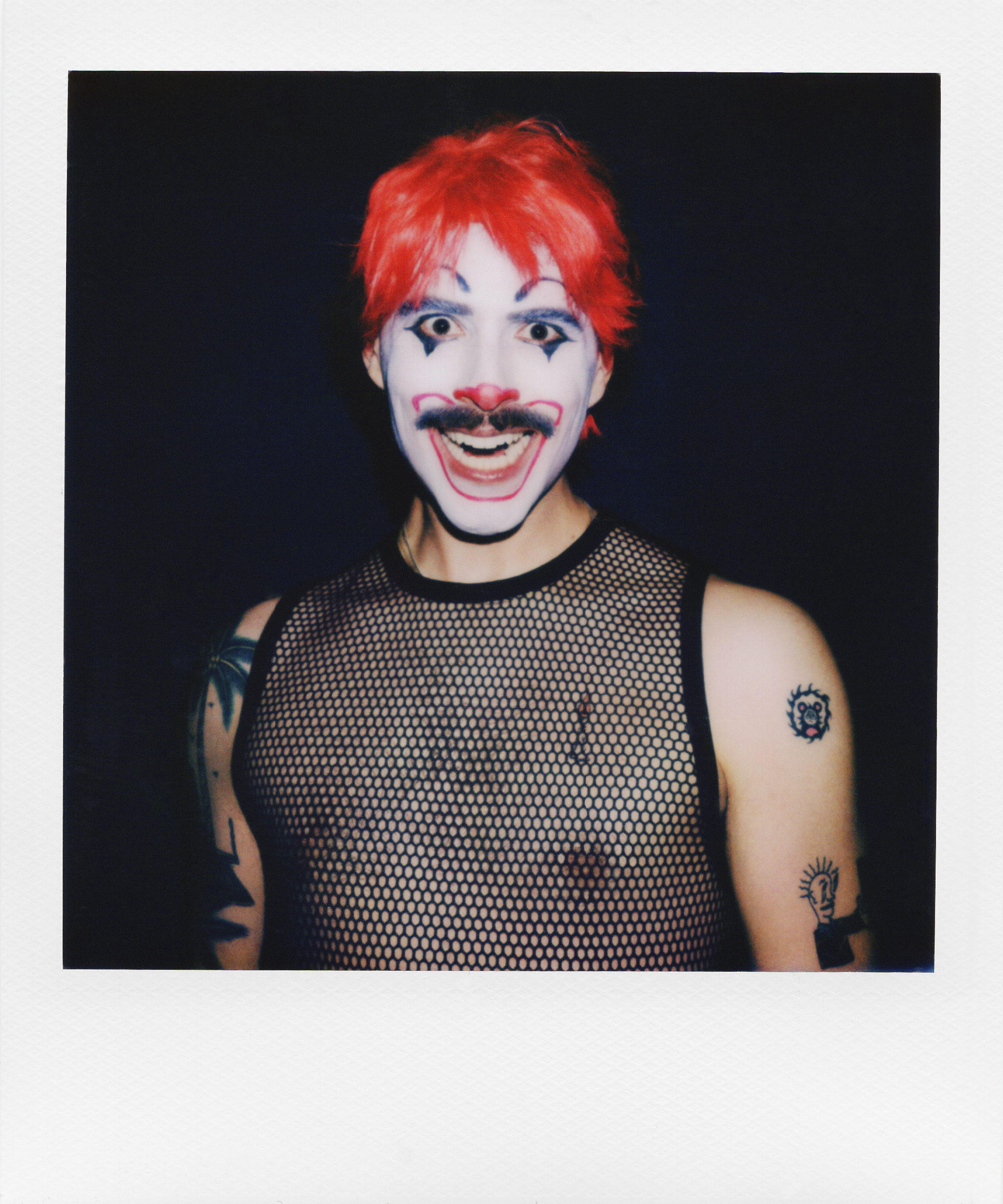
Mesh Tank by Dries van Noten.
EARLY: I think you do that very successfully. I took a note when I was watching something of yours: I said you’re the Mr. Bean of Bushwick.
BAKER: Oh my god. That is huge.
EARLY: I want to be clear, I love Mr. Bean. Me and my boyfriend were watching Mr. Bean at the beginning of the pandemic and we were screaming laughing.
BAKER: I love Mr. Bean. 2001’s Rat Race?
EARLY: Rat Race is huge! When I saw Bean, the Mr. Bean movie, in theaters with my family, there was a divide in my family; my sister and my dad hated it, and my mom and I were laughing so hard that I peed in my pants on the way home. I peed in my pants in the car.
BAKER: Wow.
EARLY: I need to know about your first interaction with [@ElianaGhen, known for her “acting challenge” videos on TikTok].
BAKER: I don’t have any interaction with her except for her commenting once on a TikTok being like, “Ha ha, this is great.” The most mundane and just completely benign comment, in response to me being completely fucking insane with her videos. I don’t know anything about her, but that whole vibe is just so unreal to me. It lacks such consciousness and I feel like as an actor you need to be aware of how you come across. There’s this sense of complete obliviousness that you only look like an actor, and it’s so funny to me. I know that none of what I just said comes across in any of my videos because I just look like a buffoon in all of them, but it’s just so weird. It’s basically the farthest thing from acting.
EARLY: I love how she does this thing that I’m obsessed with, which is the eye flutter. I think the eye flutter isn’t real; it’s nothing that occurs in real life. It’s something actors do to literally, physically squeeze out the tears. They feel the moisture building and they’re trying to flutter their eyelids just ever so slightly so that the tear falls off the bottom lid. Then what’s happened is that people see that in movies and think, “Oh, that’s real crying.” Then they start doing it in real life, or, in this case, on TikTok.
BAKER: I think people do do that. If they’re having a fight with their boyfriend or girlfriend or something, they unconsciously replicate a behavior that an actor did in a movie they saw like ten years ago. You just replicate it because you don’t get to see people be that vulnerable that often.
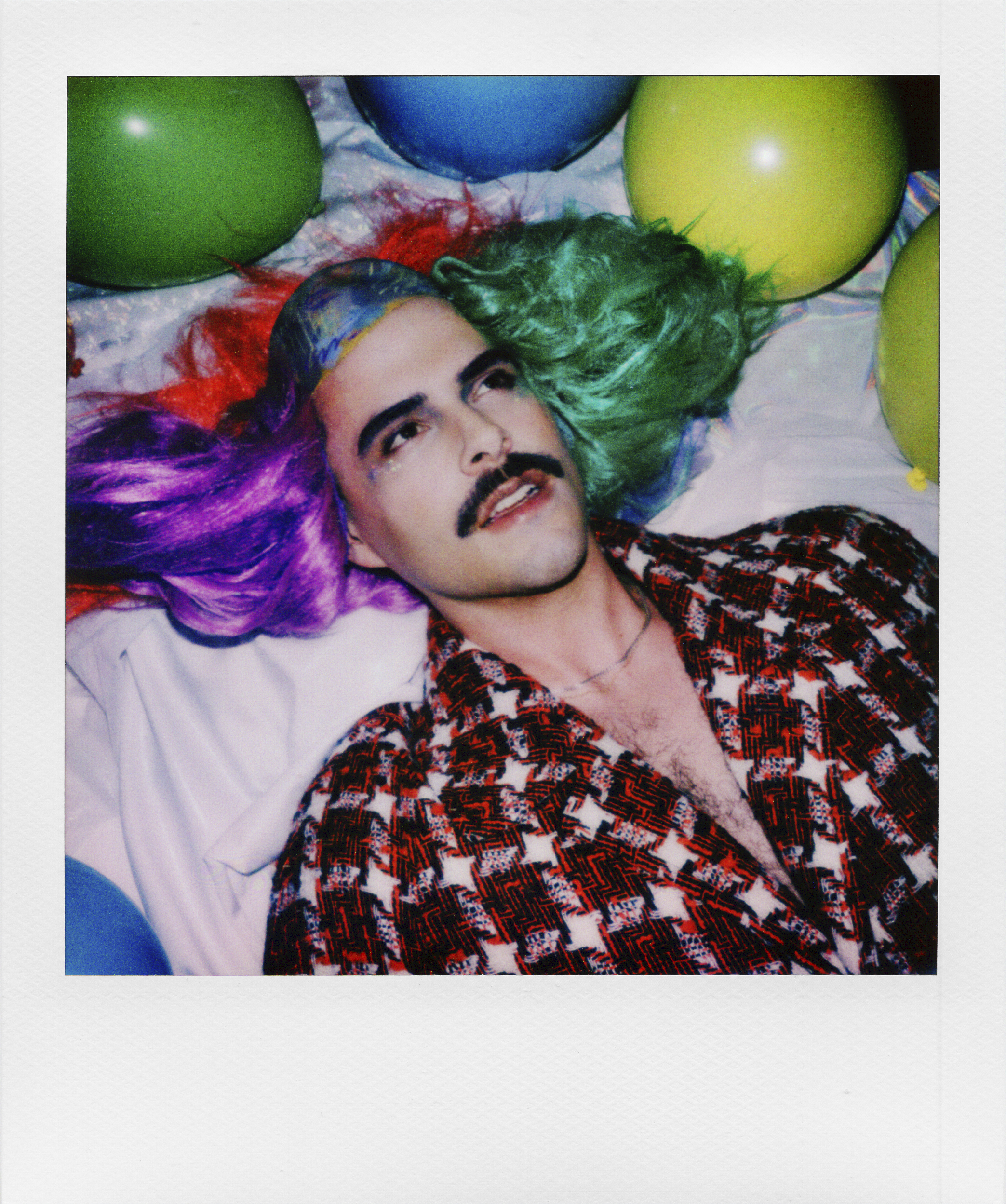
Coat by Gucci.
EARLY: I feel like that’s a very natural human impulse, in scary moments of a fight or when you’re crying or grieving publicly. Without realizing, you click into, like, “Oh I’m definitely doing a little Portman right now. This mostly feels real, but there is a little drop of Portman in this.” But now, because we’re constantly seeing TikTok and Instagram videos of people being vulnerable, you don’t know anymore. There’s no, “This is three percent Portman but 97 percent me.” Now it’s like, “I’ve completely fused as a person with the girl from the acting challenges.”
BAKER: You also lose track of what is actually authentic because you’re like, “Oh, aren’t we all just like doing bits and pieces of everyone else’s performance?” It does feel very postmodern.
EARLY: Totally, which is why it’s so nice that you’re just screaming on your Instagram.
BAKER: I like to keep it simple.
EARLY: Are there people who are very confused by what you’re doing? Does anyone in your comments think you’re genuinely doing the acting challenge?
BAKER: Oh, yeah. They’re like, “Dude, do less.” Or they’re like, “What? Why are you being this way?”
EARLY: You’re like, “I’m literally doing Mr. Bean. What’s confusing? I’m being so cartoonishly physical. How is this ambiguous?”
BAKER: Yeah. I’ll be affected by that kind of feedback and be like, “God, am I bad or something?” But then I’ll look at the person’s profile and be like, “Oh my god this person is in a completely different world of reality than me.” They might as well be speaking a completely different language. Why do I care whether they think I’m crazy or whatever it might be? The majority of people that you interact with online, I would say, are people where you’re like, “You and I are not speaking the same language at all.” It is just people from completely different walks of life.
EARLY: Okay, another question. One of my favorite Instagram posts is the one where you’re doing explainer content, direct to camera. “Let’s talk about the problematic nature of the color red.”
BAKER: Yeah, it’s a bunch of weird, fake social justice-y talking points that don’t exist. “Let’s talk about canvas bags and the HIV epidemic,” or something like that. There are so many videos like that where it’s someone performing this know-it-all, “I’ve just unearthed a new thing that people need to be aware of.”
EARLY: I find them to be deeply funny and so cathartic. I also noticed that people liking that video are constantly themselves the biggest perpetrators of that kind of video. Which, to me, is a true mask-off moment.
BAKER: They don’t see themselves in it.
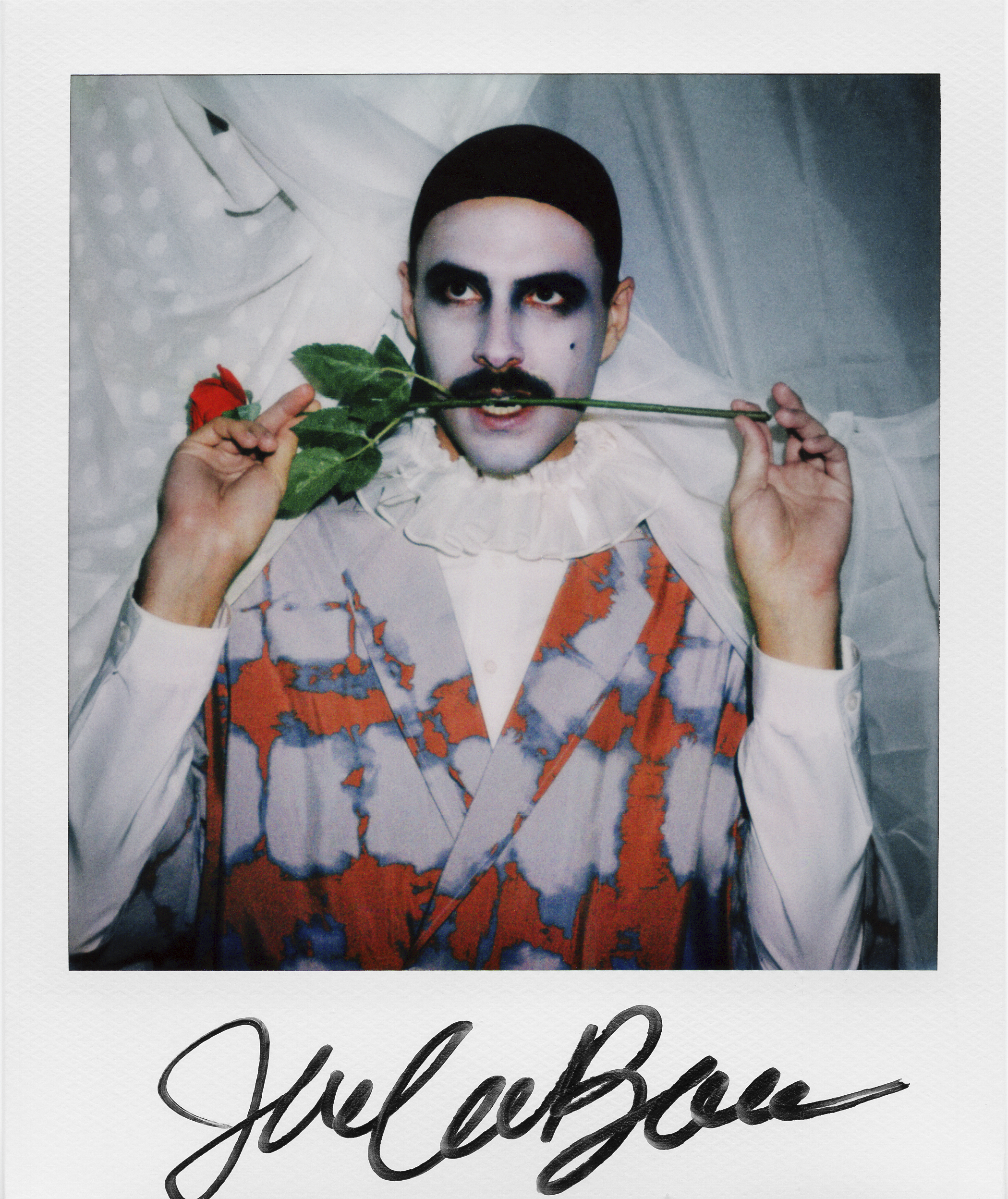
They’re like, “I’m so glad that’s not me,” when it’s like, yeah, that is you.
EARLY: I found it kind of heartening. I was like, oh, even the most annoying people on Instagram on some level know it’s bullshit and are deeply relieved that you’re making fun of it.
BAKER: That’s a way more kind way of thinking about it. I do think people have, generally speaking, a sense of humor about themselves.
EARLY: The vaccine—what’s your plan?
BAKER: I’m going to make sure I get a taste of Pfizer and then I’ll make up my mind. No, I’m going to get it as soon as I can, I promise.
EARLY: Joe, let me just get it firmly on the record that I really think you’re one of the funniest people in the
world. I think you’re an angel and I’m inspired by your comedy and by your politics. And that’s all. That’s literally the final word.
———

